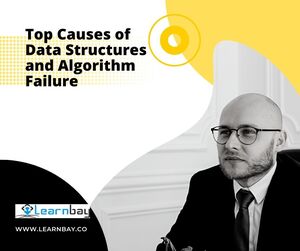Top Causes of Data Structures and Algorithm Failure
Body
Many programmers spend hundreds of hours studying data structures and algorithms in preparation for their dream careers in computer science. However, some struggle to improve and fall flat on their faces in the interview. Many factors could be at play.
Learning this subject is not without its challenges for beginners, even at the beginning. To succeed in coding interviews, one needs to quickly get past some of these widespread challenges. Here, I’m sharing the top DSA learning obstacles after five years of teaching.
Generally held opinion regarding Data Structures and Algorithms(DSA)
The idea that data structures and algorithms are overly complicated and difficult to understand is popular. Sadly, newbies frequently inherit this unfavorable perception.
On the other hand, DSA encompasses so much more than just getting ready for coding interviews! In reality, you'll see thousands of data-intensive apps rely on effective algorithms and different data structures if you look around. Algorithms are frequently significantly used in applications even when not explicitly required. For instance, efficient caching techniques rely on data structures and algorithms, just as fast networking depends on routing algorithms.
Therefore don't let misperceptions prevent you from moving forward. You can master DSA and utilize it to accomplish your goals in computer science if you have the correct attitude and commitment.
-
Lack of Continuous Learning
You must be constant in your practice to master data structures and algorithms. Your knowledge of concepts and capacity for problem-solving may suffer if you neglect practice or revision for an extended period of time. When you want to restart, you frequently have to start from scratch.
It's critical to have a constant learning strategy incorporating activities like self-study, revision, paper problem-solving, code practice, conversation, doubt resolution, mock interviews, and more to truly thrive in DSA for interviews. Doing so allows you to maintain your course and advance steadily towards your objectives. For the best online course refer to Learnbay’s data structures and algorithms course.
-
Dependencies between Topics
Many topics are interdependent, and programmers frequently acquire ideas in a convoluted sequence. They occasionally try to acquire complex ideas before mastering the basics. Here are a few ideas:
- Before understanding non-linear data structures, learn linear data structures.
- Prior to learning stack and queue, learn about arrays and linked lists.
- Iteration, recursion, and sorting are foundational concepts to get started with.
- Get familiar with greedy algorithms following dynamic programming.
- After grasping the idea of recursion, study backtracking.
- After learning the binary tree, one should study BST, heap, and trie.
- Study graph after graph.
The concept would be straightforward: We must adhere to a well-designed curriculum arranged with minimum dependencies and in the right order of DSA topics.
-
Complex explanation of Concepts
One of the main difficulties in learning data structures and algorithms is this. Programmers frequently become mired in cryptic language and inadequate explanations. Sometimes they continuously discuss the same point without delving into the notion. It generates a few significant difficulties:
- Waste of Time and money
- Poor interest in the subject
- Habit of memorizing
-
Memorizing Concepts and answers
Instead of memorizing the various data structures and algorithms, it is crucial to concentrate on comprehending the ideas and principles underlying them to become proficient in DSA. This entails devoting sufficient time to solving issues, evaluating various strategies, and exercising critical thought about the solutions.
You will be more prepared to apply these ideas to new issues and develop creative solutions if you build a solid understanding of the subject matter. To actually comprehend and be able to apply the principles in a variety of scenarios is the aim, not just to memorize data.
How can I come up with a Solution?
Although most programmers are skilled at writing code, coming up with effective solution approaches is a genuine difficulty. Sometimes people make numerous attempts to find solutions but still have trouble doing so. Why? The cause is straightforward: They rushed to consider the answer instead of taking their time to fully consider the situation. Even they refrain from engaging in numerous variations and patterns.
How do you develop proper code?
The right code can be difficult for programmers to write at times. Finding the right answer is an art; creating the right code is a skill. Here are some important points to consider:
Focus, tolerance, and time are needed for proper implementation.
Programming ideas, implementation patterns, common programming errors, appropriate initialization, base cases, boundary cases, and, most importantly, a clean code style are all things that must be practiced.
Check out the trending full stack software developer course in Pune, developed in accreditation with IBM.
-
Fear of logic and math
Mathematical concepts like permutations, counting, summation, logarithms, numbers theory, bits operations, recurrence, etc., are needed to understand data structures and algorithms. To solve issues and do analysis, we mostly use these themes.
Here are some suggestions to help you understand math concepts and develop your analytical abilities:
- Try out some DSA-related math exercises. Numerous internet resources provide examples and explanations for practice problems.
- Consider enrolling in a math course, which addresses many mathematical concepts important to DSA.
- Work on coding issues and use big-O notation to assess their time and space complexity. This will enable you to get more at ease with the process of algorithm analysis.
- Work together with others to analyze and discuss various algorithmic analysis techniques. If you have a peer or mentor with a solid background in math, this can be extremely helpful.
-
Lack of interview skills for coding
Most programmers find it difficult to create effective solutions during the interview while the work is being closely monitored. Even when being interviewed, we must speak out and be clear with the interviewer. The ability to concurrently write solution code and communicate is crucial. Despite having strong coding and problem-solving abilities, we occasionally neglect these capabilities and get turned down. The truth is that the interviewer is seeking a candidate for their organization who can easily handle a variety of challenging scenarios while at work.
Conclusion
In conclusion, learning algorithms and data structures first can be difficult. It calls for perseverance, diligence, and a cheerful outlook. You may strengthen your problem-solving abilities and become a more compelling job applicant by adhering to a well-structured learning plan and practicing with simulated interviews and real-world applications.
While you learn DSA, remember that it is common to encounter challenges and skepticism; therefore, resist the need to give up. You can successfully grasp these foundational concepts and advance your profession with the effort and perseverance necessary. With Learnbay’s DSA course, you will become an expert and ace your technical interview.













Comments